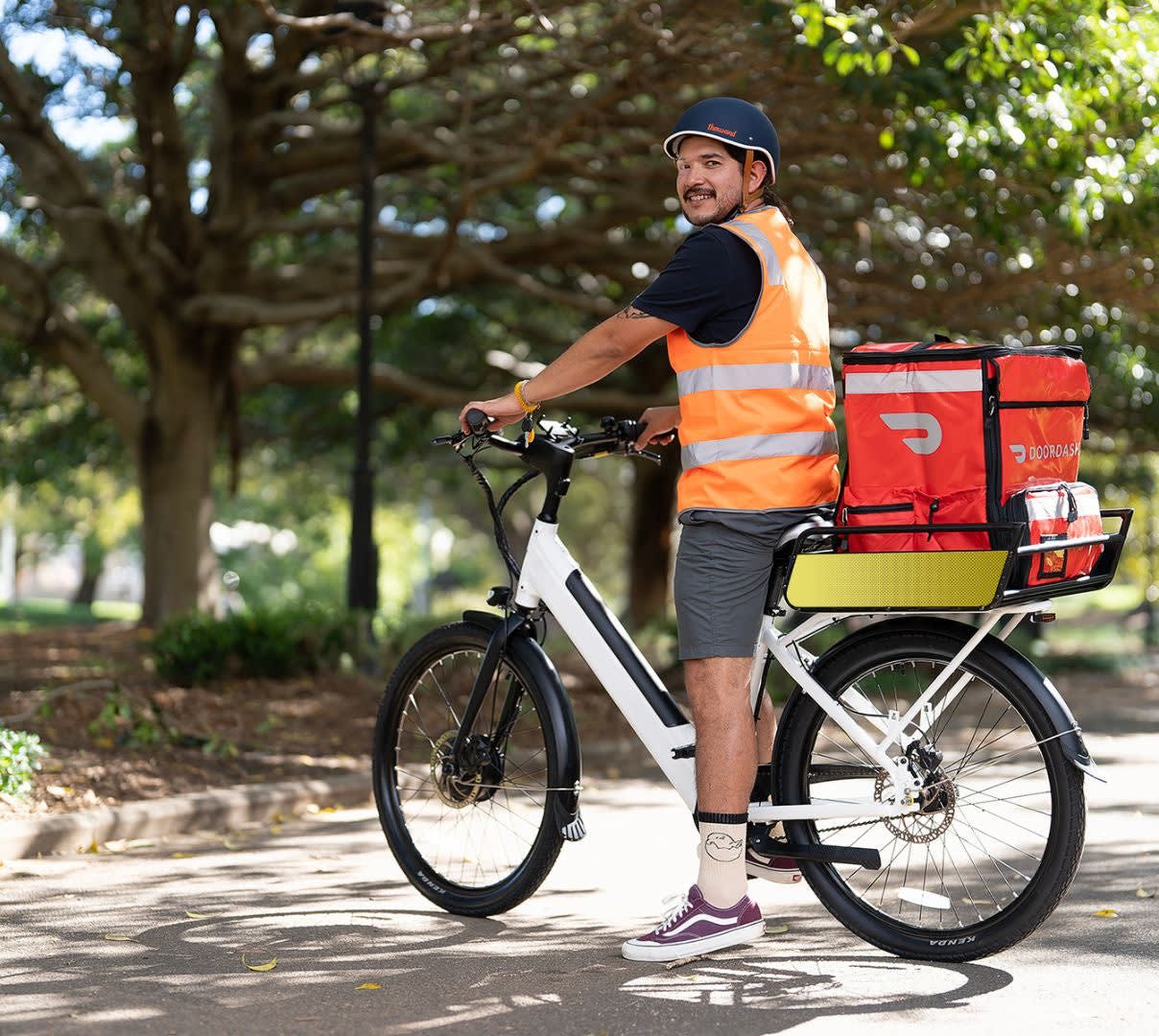This newsletter aims to separate the signal from the noise for investment in all things sustainable transportation: Electrification, mode shift, active and public transit, and mobility aggregation, across both people and goods movement.
This issue’s Deep Dive is on the continual growth last-mile delivery, with smart operators reducing their vehicular footprint to minimize costs and maximize throughput.
🌱STARTUP WATCH: Sustainable mobility startups (pre-seed or seed) to keep an eye on
Anactisis (Pennsylvania, USA): Polymer-based materials to recover critical minerals from industrial waste streams
EVIA AERO (Germany): Zero-emissions regional airline
ExploreTech (California, USA): Software to improve the discovery of minerals used in batteries
LoneReport (California, USA): Automated ESG reporting, including for supply chains
Nice Car Company (California, USA): EV retrofits of vintage cars
Omnifold (California, USA): AI to improve the efficiency of supply chains
Zero5 (California, USA): Turning parking spaces into smart infrastructure hubs
💰FUNDING: Capital raises from startups previously featured in Startup Watch
Alt Mobility (Vol 26) raised a post-Series A Bridge Round from Beyond Capital Ventures (amount undisclosed)
Currents (Vol 78) secured an investment from E8 Angels (amount undisclosed)
Zero Homes (Vol 99) raised a Seed Round from Exelon (amount undisclosed)
Know someone who invests in startups in this space?
📰QUICK HITS: Notable news from the last two weeks
👩🏽⚖️Government, Policies & Cities
🫨 The New York Police Department has acknowledged that its recent bike crackdown isn’t based on data, but sentiment at community meetings. A good example: two weeks ago, over 100 protestors gathered outside Central Park to push for a ban on e-bikes in city parks.
↗️ Meanwhile, in London, cycling is up by more than 50% in the past two years. Since 2017, motor traffic has fallen by 34%, well ahead of the target of a 25% reduction by 2030.
👫A new trade group has formed to protect parts of the Inflation Reduction Act: the American Fleet Leadership Coalition. Republicans in the House continue to debate how much of the IRA to dismantle.
The US Senate is moving closer to ending California’s emissions waiver. A sign of how much things have changed: It was Ronald Reagan, then Governor of California, who set the precedent for the waiver.
🔬Markets & Research
✈️ Silicon Valley Bank has released its annual Future of Climate Tech report. Per SVB, sustainable aviation fuel may be at the peak of expectations on the Gartner hype cycle.
🚗 The International Energy Agency (IEA) released its annual Global EV Outlook. Last year, over 20% of cars sold worldwide were plug-in; the US, at 10%, now trails Thailand and Vietnam, along with China and much of Western Europe.
🏭 Corporates & Later Stage
🍎 Apple has rolled out its new CarPlay software, which effectively takes over the entire dashboard and replaces native infotainment systems. Apple will try to own the interface between cars, chargers, and the electrical grid.
🏭 Google’s Waymo unit has announced a factory partnership with Magna. While Google won’t be building robotaxis from scratch, its partnership with Magna suggests it’s getting serious about quality production.
🔮 GM has claimed a breakthrough in lithium manganese-rich (LMR) batteries that would allow for technology decoupling from China. Battery breakthrough announcements are often more noise than signal.
🇦🇺 Mitsubishi may source EVs for the Australian market from Foxconn. For more, see the deep dive “The Fox(conn) is Guarding the Henhouse.”
↘️ Tesla’s Model Y refresh may be failing to win over drivers. Things will get worse for Tesla before they have any hope of getting better: a new website Tesla Employees Against Elon, further reports of the Cybertruck being a dud, ongoing sales declines in Europe, and a viral video of a 98 year old WWII vet declaring himself once again ready to go to war to fight fascism.
👩🏼🍳 Chipotle’s President joined Tesla’s board of directors. While the timing coincides with the imminent launch of Tesla’s diner in LA, joining Elon Musk right now will raise some eyebrows.
Elon Musk’s The Boring Company is aiming for an Amtrak tunneling contract. This comes as the government seems eager to procure more from SpaceX’s Starlink.
😕 Uber drivers at LAX are increasingly desperate, with the good old days of higher pay now long gone. Uber passenger volume at LAX is likely to fall next year, when the airport (finally) gets its automated people mover connecting the airport to LA’s growing metro system.
🚌 Uber has launched a new “route share” feature for commuters. As noted on social media, this competes with buses.
🚲 Lyft appears to have won the contract to take over LA’s bikeshare program. One of the strategic priorities for LA, no matter the operator, is to deploy more e-bikes.
🇪🇺 DoorDash is buying European rival Deliveroo. Deliveroo is a sick patient but helps DoorDash become more of a presence in Europe and the Middle East.
🛩️ JetBlue has sold off its corporate venture capital arm. The airline is going through a major reorganization to return to profitability.
🛬 In an effort to correct Boeing’s tailspin, the company has appointed Wisk CEO as head of product development at its commercial airplanes unit. For more, see “Boeing’s Nosedive is Our Climate Problem to Fix.”
💀 Bike manufacturers in the US, already few and far between, are closing down production in response to Trump’s tariffs. The interview with Steve Kaczmarek, the founder of Borealis Fat Bikes, is a sobering example of long-term economic theory meeting near-term market realities.
🐣 Startups & Early Stage
🛤️ Sun Ways (Startup Watch Vol 66) has deployed its first “solar embedded in railway tracks” pilot near Neuchâtel, Switzerland. An interesting step before solar becomes embedded in vehicle exteriors across cars, trucks, trains, and other vehicles.
🚁 Archer has announced that it will be the official air taxi (eVTOL) provider for the 2028 Olympic Games in Los Angeles. As journalist Alissa Walker points out, the 1984 Olympics in LA did a notable job managing traffic between venues without air taxis.
🏆 Slate, the startup featured in last issue’s deep dive, now claims to have 100,000 reservations. The company has been a prolific digital advertiser.
📥 Passenger train startup Brightline has announced a co-working offering. The partnership with Industrious covers both stations and train cars.
Know someone who should be on the mailing list?
DEEP DIVE: Last-Mile Delivery is Shrinking as it Grows
The first known usage of the phrase “private burrito taxi” dates to July last year on X (Twitter). The subsequent debate devolved into a digital shouting match focused on the relative costs and benefits of delivering a 1lb burrito by a 4,000-pound car.
Over the last decade, and especially since COVID, last-mile delivery of parcels, food, and everything else has exploded. The World Economic Forum and McKinsey estimate that congestion will rise by 21% this decade as a result of our love for last-mile delivery.
So, how are logistics players evolving? Delivery is getting small. By avoiding the 4,000-pound car and shifting to a two-wheeler (e.g., moped, motorcycle, bike/e-bike), logistics players are both reducing capital expenses and speeding up deliveries, saving time on both driving and parking.
DoorDash recently shared a treasure trove of data about its food delivery operations, with a city-level breakdown of delivery by 4-wheeled versus 2-wheeled vehicles. According to the company, the share of deliveries by 2-wheelers in their network tripled over the last three years, albeit with huge variation by city.
Part of this disparity between cities is driven by congestion levels. The more a city suffers from car congestion, the more likely that a driver or fleet operator will see significant benefit in downscaling from a 4-wheeler to a 2-wheeler.
What will drive further growth of 2-wheelers for delivery? For starters, city policy. The more a city commits to infrastructure like dedicated bike lanes, the more logistics players shift to 2-wheelers.
We’re still at the early stages of this transition in the US, and e-bikes aren’t a panacea. For parcel delivery, with centralized depots and higher volumes, 4-wheeled micromobility may be the better solution. Last year, New York City approved the use of European-style e-quads for use on city streets, aiming to reduce congestion from medium-duty vans.
The shift towards last-mile delivery for everything from burritos to prescription drugs may be inevitable. Thankfully, we’re starting to use the right tools to avoid potential increases in congestion and pollution. Here’s to the “private burrito taxi” becoming the “private burrito bike.”
Ever wondered what about the most beautiful and saddest parking garage in the world? Detroit’s Michigan Theatre, built in 1926, was gutted in the late 1970s to become a parking garage.







